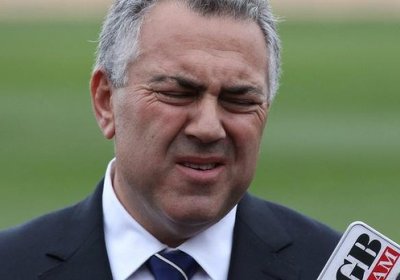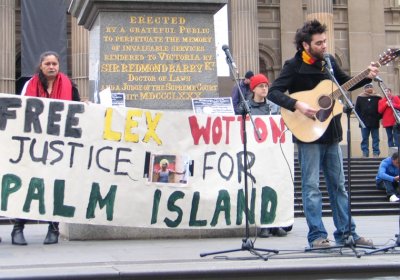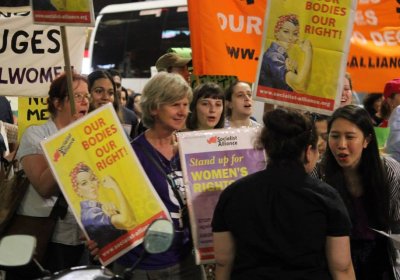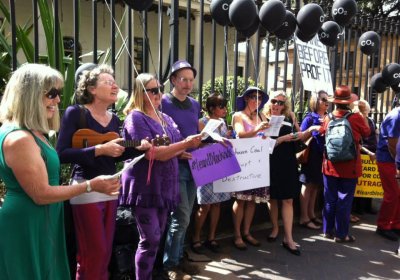Since the start of the year, many newspapers have dedicated article after article to predictions of a looming demise of South America's so-called “Pink Tide”
The term “Pink Tide” is used to refer to the wave of left-of-centre governments elected in South America in recent years.
Several such governments have recently been up for re-election. Pollsters and commentators alike argued that for many, their time in government was up.
Instead, on October 26, Brazilians re-elected Dilma Rousseff as president, ushering in a fourth consecutive Workers’ Party administration.
1031
Prime Minister Tony Abbott has indicated his government plans to increase the Goods and Services Tax (GST).
Before last year’s election, Abbott promised the Australian people that “the GST won't change, full stop, end of story”. But on October 27, he called for a “mature debate” on the topic, making it clear his government intends to increase GST revenue.
One of the most striking features of the first year of Tony Abbott’s government is the sustained attacks on Centrelink clients.
These started with the federal budget and its proposed cuts to Newstart Allowance for those aged under 30, Family Tax Benefits for sole-parent and low-income families, and restricted access to Disability Support Pension.
These were followed by employment minister Eric Abetz announcing the expansion of Work for the Dole to all jobseekers under 50.
The United Nations General Assembly voted overwhelmingly for the 23rd time on October 29 to condemn the decades-long United States economic embargo against Cuba.
Reuters said that day that many nations praised the socialist country for its response in fighting the deadly Ebola virus that is ravaging west Africa. Cuba has sent hundreds of doctors to affected countries in west Africa.
Ezekiel Ox is a long-term singer-songwriter and activist for social justice. He has a reputation for energetic live performances across Australia, the United States and Britain with bands such as Full Scale, Mammal and Over Reactor.
Tasmania’s Liberal government has amended its anti-protest bill to allay fears from concerned groups who say the laws are undemocratic and a threat to free speech.
The laws were passed in the state’s Upper House on October 30, and will be further amended by a committee.
A coalition of more than 20 community groups, including unions, the Tasmanian Aboriginal Centre, The Wilderness Society and the Australian Lawyers Alliance, released a joint statement urging parliamentarians to drop the Bill.
Edinburgh’s Augustine United Church is a pretty cold place when the wind is howling, as it was when the Scottish Socialist Party (SSP) held its annual conference there on October 25.
But all feelings of chill disappeared when the 200-plus SSP members got down to tackling the challenges of an inspiring new period in Scottish politics.
The period is marked by unprecedented popular engagement in activism and debate over Scotland’s future. This phase was triggered by the referendum on Scottish independence, won by the No vote by 55% to 45% for the Yes side.
The annual Reclaim the Night rally was held in Sydney on October 31. Hundreds rallied in Hyde Park to protest against gendered violence, rising Islamophobia and the closures of women’s refuges.
The People's Common Rights and Provisions Bill 2014 was debated in a mock parliamentary sitting in Brisbane on October 28. Community group Lock the Gate planned to hold the event inside Parliament House. But Speaker Fiona Simpson said the event was an affront to the dignity of parliament and would not allow it.
The Bill was organised by activists to protest about the state of politics in Queensland and address issues such as a lack of democracy, unrestricted mining and the loss of clean air, water and agricultural land.
The long-term average rise of the Australian Bureau of Statistics (ABS) wage price index is 3.6%.
In the first half of this year, it increased at an annualised rate of only 1.7%. The latest National Australia Bank quarterly business survey shows labour costs have been rising at an average annualised rate of 1.5% since the last quarter of 2012. This compares with an average of 3% a year between 1998 and 2008.
About 50 people rallied outside the Mint Bistro in Macquarie Street on October 28, carrying placards and black balloons marked CO2, to protest against Whitehaven Coal’s annual general meeting being held inside.
The protesters accused the company of ignoring the wishes of communities living near mining projects in the Leard National Forest and at Maules Creek in northern NSW.
A fierce debate over women’s participation in video game culture has erupted online. Known as “GamerGate”, it is a battle over power and sexism in video games.
Women now represent nearly half of those who play video games, and the traditional gamer identity is being challenged. The problem of sexism in video games is part of a wider problem of misogyny in society, and in the same way misogyny is being confronted in parliament or at universities, it is also being confronted in gaming.
- Previous page
- Page 3
- Next page








